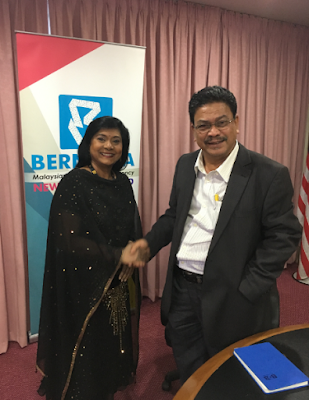 |
| General Manager Datuk Zulkefli Salleh thanked Durga for her long service after a management meeting on Friday |
By
Azlee Nor Mahmud
Today
marks the last day in office of Bernama Deputy Editor-in-Chief, Economic News
Service (BES) S. Durga Varma after serving the organisation for nearly 40
years.
She was appointed to the post on March 14, taking over from Nor Faridah Abdul Rashid who retired a day earlier.
She was appointed to the post on March 14, taking over from Nor Faridah Abdul Rashid who retired a day earlier.
Lauded
as the country’s first commodities reporter, Durga served the national wire
service for her entire career.
Joining
Bernama on Jan 1, 1979, she began her career at the general news service,
covering court and crime, and was transferred to BES which was then headed by
Mohamed Hashim Ahmad Makaruddin.
At
BES, Durga was assigned to the commodities beat at the time the Ministry of
Primary Industries proposed the setting up of the Kuala Lumpur Commodity
Exchange (KLCE), which traded the crude palm oil (CPO) futures contract -- the
first in the world -- in 1980.
She
kept tabs on the development of the exchange every step of the way since its
inception.
"There
was no other exchange for CPO futures trading which served as a price reference
point for other international exchanges, especially the Chicago Board of Trade,
which traded soybean futures. Palm oil is the closest substitute to soybean
oil,” she said in an interview.
Durga
said Indonesia, being the world’s second largest palm oil producer then, had no
inkling of how to develop a palm oil futures exchange, she said.
"The
experience put me in good stead in developing the writing of commodity futures
reports -- CPO, RBD palm olein, tin, rubber and cocoa. Having developed an
interest for the commodity industry, I also focused on the development in the
timber, pepper and pineapple industries.
“I
was covering the commodity industry for 18 years before I was asked by
Executive Editor then, Chan Kwan Hoi to take on the finance beat as I was
covering one beat far too long.
“The
finance beat was where I developed the ringgit, interbank and money market
reports which are all being written until today for the use of the local
media,” she added.
One
of the highlights of covering the commodity exchange was the fiasco involving
CPO market reports, she said, adding that, trading was halted on the KLCE
market for eight months over settlement issues which had to be ironed out
before trading could resume.
“Having
had to learn the rudiment of covering the market, I had to do a lot of reading
as there were a lot of terminologies to learn, as the dealers took for granted
that I understood everything. Some of them were extremely helpful and
accommodated my enquiries.
“I
used to mingle with them (dealers) after trading hours just to establish
contacts. This went a long way towards helping me establish good working
relationship with traders who always alerted me as and when there were new
developments in the industry,” she said.
Durga
said in 1986, the palm oil industry came under fire by a smear campaign,
prompting Malaysia to formulate a hard-sell international campaign to douse the
sceptics on misconceptions of the commodity.
The
initiative was led by Primary Industries Minister then, the late Tun Dr. Lim
Keng Yaik, who had to ask research institutions to conduct studies on palm oil
in order to get independent views on the commodity nutritional values.
Other
misconceptions included the clearing of massive lands, thus destroying animal
habitats and the ecosystem, resulting in animals becoming extinct. In fact,
Malaysia is one of the few countries with natural reserves of 56 per cent.
For
Durga, one of her memorable experience was following Economic Adviser to the
Government then, Tun Daim Zainuddin on his working visit to Sri Lanka.
“I
had the rare opportunity of interviewing DRB-HICOM Chairman then, the late Tan
Sri Yahaya Ahmad, who was among captains of industry accompanying Daim, in
midair.
“After
the interview, Yahaya invited me to go into the cockpit of the plane with him
and asked for the pilot permission. The view was breathtaking as the plane
approached the runway for landing," she said.
Durga
was seconded to Bernama TV to produce the English news bulletins from 2002 to
2008.
"It
was totally a new experience trying to fit so much news in a 30-minute news
bulletin, but it was a satisfying experience when you see your news ‘on air’
with your name in the ending credits," she said.
In
2008, she returned to BES as Deputy Chief Sub-editor (English) before becoming
Chief Sub-editor and eventually Deputy Editor-in-Chief of the service.
Reflecting
on her experience in journalism, she said reporters of yesteryears took down
notes and referred to their tape recorders to double check on quotes.
“We
used to send stories to the office using coin-operated public phone and usually
filed the stories within 30 minutes after the assignments. But with the
advancement of technology, reporters now depended too much on technology.
“Speed
was of essence then which young reporters of today should observe by not
relying too much on tape recorders.
“Reporters
need to understand the subject matter, as when you are informed of the subject
matter, you are able to ask intelligent questions,” she said.
On
Bernama’s journalism ethics, she said: “First and foremost, the biggest
responsibility is to uphold the organisation's good name as it is a
well-established media organisation in the region.”
--
BERNAMA
No comments:
Post a Comment